BRENDAN O’CONNOR, OF BIG GUYS SAUSAGE STAND, seemed to outsiders to be golden as operators of hot dog stands go. His restaurant, just on the Berwyn side of Roosevelt Road near Harlem, had earned acclaim as a place in the Hot Doug’s mold, serving housemade sausages with unusual toppings and fresh cut fries. It had been on lots of food TV shows, gotten good coverage in Chicago media, and been named an LTHForum Great Neighborhood Restaurant after plenty of enthusiastic write-ups.
The restaurant business is never so simple, of course, and by the summer of 2015 O’Connor felt like he was in the midst of his toughest year yet. Catering was a big part of his business, but a wet summer had rained out a number of his festival gigs, leaving him to eat the cost of the food he’d prepared. Expanding to late night hours, he says, boosted his revenues, “but it just got to a breaking point. Everything from employees kicking holes in the wall, them being mismanaged because the hours are too long but I didn’t have the management to do it, to poor customer service, poor food quality, and I had to go in all the goddam time—all these issues were arising at these late hours.”
And after four years in business, he just felt fatigued. “I didn’t have energy. I thought it was psychological, I really did,” he says. “I had a lot of stress at the time. I had been sick for a long time and didn’t know what was wrong with me. Finally, as a 32-year-old man with lots of obligations, I got myself to the doctor. And he said, you should really get things checked out. So I finally got checked out.”
The diagnosis came back: at age 32, Brendan O’Connor, with three kids and a busy business, had rectal cancer. Within a few days, he would be undergoing chemotherapy and radiation treatment and fighting for his life.
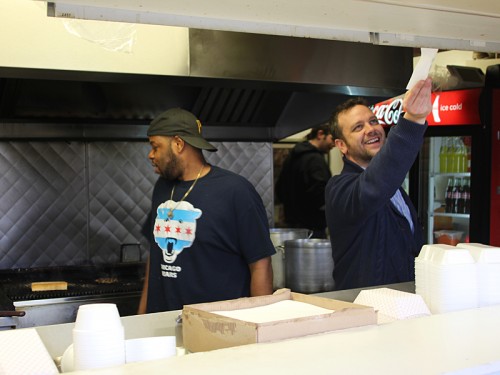
“I WANTED TO BE A FOOD WRITER, BUT somehow ended up going this route,” O’Connor says as we take up a spot at the dive bar next door to Big Guys. A genial Irish-American with a profanity-laced South Side accent, who always seems to have two days’ growth of beard, O’Connor seems cast in the part of the hot dog entrepreneur who knows every cop and trucker who comes in. You have to talk with him for a bit for the businessman who’s pretty sophisticated about marketing a little guy’s stand in 2016 to come out, too.
He went to Columbia College and started with a job in journalism, but he already had a daughter, Dylan, now 13, and he felt he needed to make more money. So he went into sales, while doing catering jobs on the side from his house. He had a history in the food business at that point—as a teenager, he and his friends had sold hot dogs to visitors during the open house weekend for the Frank Lloyd Wright houses in Oak Park, under the name Wright Lloyd Franks.
When the sales job ended, he got together with some friends and put his severance into taking over a 1950s-style stand that had been a Parky’s, a small hot dog chain in the near west suburbs. He didn’t just want to do hot dogs, though—his ambition was to make his own sausages and, in general, offer a better, more handcrafted product than the other fast food places around him.
“We don’t get the business off the street, there’s such an oversaturation of restaurants right here,” he says. “We’re on Roosevelt Road but we don’t draw traffic from Roosevelt Road. Almost all of our customers set out to come here.” He quickly realized that he needed to attract customers willing to travel for something new—”A lot of people tell you, just do what you do and build up a following. I feel like a lot of the old time places did that, but when you’re new like me, compared to these places that have been around for 50 years, you can’t wait for that to happen. [The day] we opened we sold like six sausages and fries.”
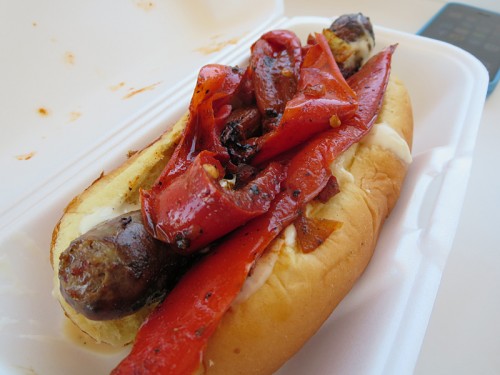
Italian sausage
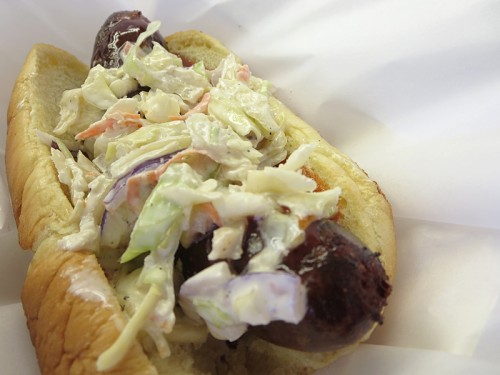
Smoked hot link
The first thing he did, after observing that “every fifth customer would walk in and say, ‘You don’t have a burger?’ and walk out,” was expand the menu to include a burger—an excellent handmade patty of meat which he’s careful not to overwork. Then he started working on specials, which he promoted on social media. “We have to get people in. Obviously, everybody’s on their phone, so [their question is], why is what you’re tellin’ me about important? Well, the only reason it’s important is because it’s a special happening right now. That’s what people respond to.”
“Everyone sells hot turkey, and it’s all canned gravy and foil turkey—why doesn’t anyone just make a god-damned turkey? It’s not that hard.”
He makes seasonal sausages—a Turducken sausage is a big seller every November. And he does other forms of what he calls “blue collar gourmet” food—”We did homemade gyros, smoked meatloaf. We did pastrami, where we brined the briskets and smoked them with beech-nut wood. We’re always doing stuff, because I’m too attention deficit and I get bored. But so are millennials in general, and the customer base these days, they want new, different, fun stuff.”
And he takes seriously how he makes that stuff. “The idea is we want to make a common sandwich that has turned generic or doesn’t get that much attention, and make it good,” he says. “Turkey is a great example because everyone sells hot turkey, and it’s all canned gravy and foil turkey—why doesn’t anyone just make a god-damned turkey? It’s not that hard, right? We’ll brine ours and fry it up fresh and make mashed potatoes, and buy all the turkey necks we can get and sell hot turkeys for a week, and it goes insane.” At Thanksgiving, he lined up 11 deep fryers, most borrowed from a friend, and fried 72 whole turkeys that customers had preordered for their own feasts.
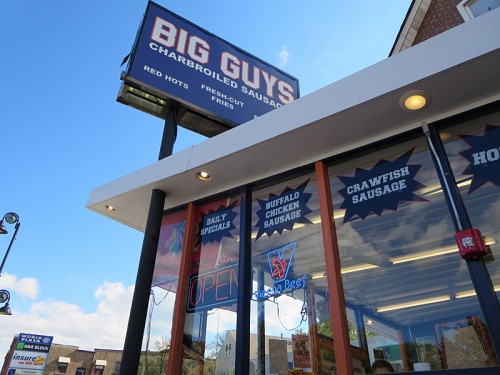
“IT’S FLOWN BY,” O’CONNOR SAYS of the seven months since his diagnosis. “I actually handled all the treatments really well, radiation daily for like 35 days with chemo, and then another round of full-blown intravenous chemo for two weeks, and then that led into a little break which I’m on right now. Chemo and radiation was really easy for me. It really was. I think about it now and I’ve pretty much been constantly going through chemo or radiation since July, and that’s kind of a long time, but it flew by.”
But he acknowledges that it dramatically altered a life that had been defined by the daily grind of his hot dog stand. “It messes up your schedule big time. You’re amazed how much time you’re in the hospital, going to doctors. When you have kids, you’re always doing that anyway—you’re always running them somewhere for this doctor or dentist or whatever. But all of a sudden you’re going every day or a few days a week, and you’re like, Jesus, all I do is spend my days in waiting rooms. That’s what your life becomes.”
“When you’re doing your day to day work, it’s hard to look at the big picture. So when you get to step back and look at things, all of a sudden there’s issues that you’ve been dealing with that you realize, you can’t afford not to deal with. I think it’s caused me to run my business a lot better, actually. You stop relying on yourself as much. You still keep up with work somehow, delegate more or whatever. I’ve found that I’ve really gotten much better at delegating my workload at Big Guys than before. Because I have no choice.”
The treatments went well, but there was a big step waiting at the end—on the day of this article’s publication, O’Connor was going in for major surgery, to be followed by recuperation time and a final round of chemotherapy. If that goes well, “I should hopefully be in the clear,” he says, but the surgery, which will leave him with a colostomy bag, will have changed his life forever. “It’s not like you have a choice, there’s nothing you can do about it so it doesn’t matter. Loyola, they’re really good at this. I went in for my pre-admission, and they do more surgeries than I sell fucking hot dogs in a day. That’s fucking insane, right? They literally do, I’m not exaggerating. I mean, their waiting room is like eight of these bars.”
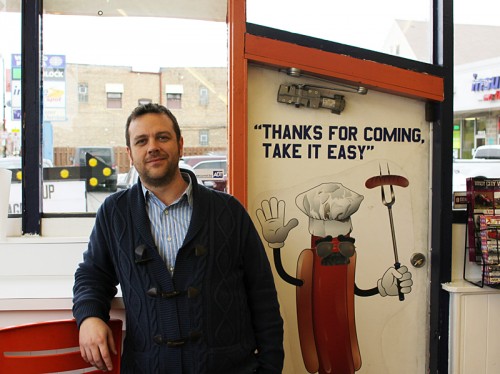
“SO I’M SPENDING A LOT MORE TIME home, not giving a shit about work, know what I mean? Just doing what I want to do,” O’Connor says of the days he’s been out resting after treatments. And that seems to have awakened some of that creative impulse that wasn’t being satisfied by being creative with sausages.
Part of that is that he wants to start a blog, documenting the sausages and other specials they make. “There are no good sausage blogs out there,” he says. If he shows how he makes things and spreads the word on social media, it helps market their specials, and maybe calls some attention to himself as another innovator in the encased meats realm.
But that’s still business. His other creative project is closer to home. “I think when something like this happens, and you’re wrestling with your own mortality a little bit, even though we all have kids and we know we love them and whatever, it still makes you appreciate them that much more,” he says. “We all know that our kids are the most important thing, but, you think about it, and life is fragile, no, I need to spend more time. And when you own your own business, obviously you’d rather be with your kids, but you don’t have a choice. You’re working because somebody called off, or you’re late to everything. It’s just kind of how life goes.”
“I think it put a lot of things in perspective for me. I was already home because I was going through the chemo, and that tended to wipe me out for a couple of days. So I’d be home just relaxing, and I’d keep the kids home from the nannies, and we’d make banana splits.”
Besides his older daughter Dylan, he has two toddlers, “Irish twins” he says, four and three years old, named Riley and Mickey. “Everybody thinks their kids are cute, but my kids are incredibly cute,” he says. “And even though they’re girls, they’re totally gross and funny. They’re so hilarious.” For something to do with them, they started making banana splits—”We make like a $45 Jewel run and make a real banana split, ice cream and whipped cream and pecans”—and then thinking up poems to write. “They’re little kids, but they come up with crazy ideas, and it’s really fun. One’s about an evil teacher who steals all your stuff. Mickey has a blanket called Nanna, that’s the grossest thing, and so one’s about, what if Nanna came alive?”
He’s working on a book in which each chapter is a meeting of The Banana Split Club, and it would have the narrative of how they came up with the poem over banana splits, followed by the poem. “I’m really happy with it, and it does something for me—from being in the restaurant industry, if you’ve been in the restaurant industry and stayed with it, you obviously love it, and I do. But it has its stresses and then on the ownership side, it’s hard for me to walk through my restaurant and not see something that’s costing me money. To be home with my kids, to get that extra time with them, has been awesome.”
SCARY DOOR
I swear! That door just opened all by itself?
Is there an invisible man… a tiny elf?
I mean, it’s open now and there’s nobody there.
I’m pretty smart and I know door knobs don’t just turn from air.
Rogue Jedi’s, telepathic maniacs, or ghosts would be a horror.
So I think I’m gonna need my mom’s help here moving forward.
To discover what supernatural force is involved.
So I can stop hiding and this mystery is solved.
Michael Gebert is the editor of Fooditor.
Poem ©2015 Brendan O’Connor. All rights reserved.
Latest
Join the Discussion
After you comment, click Post. If you're not already logged in you will be asked to log in or register with Disqus.



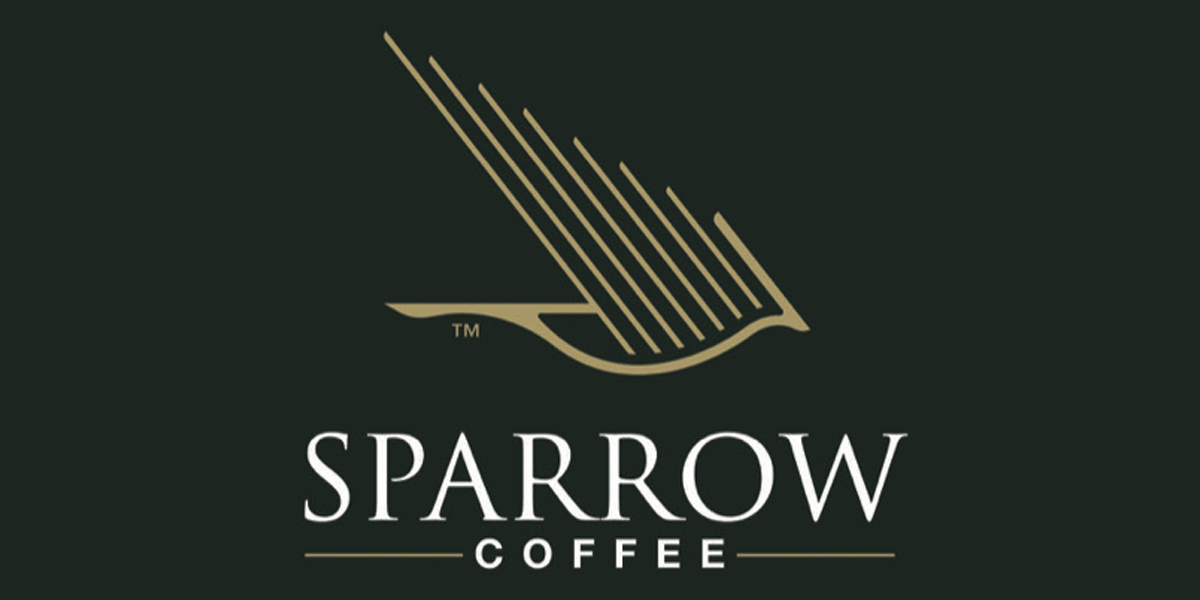
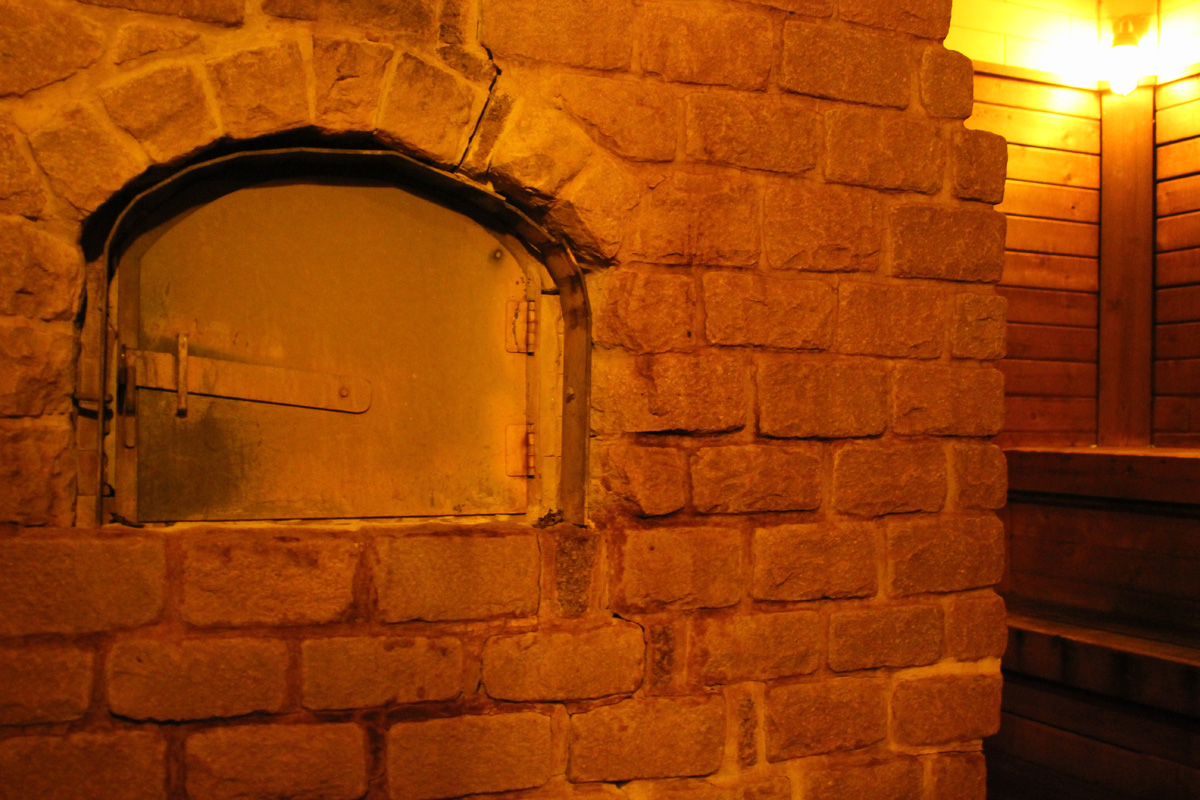
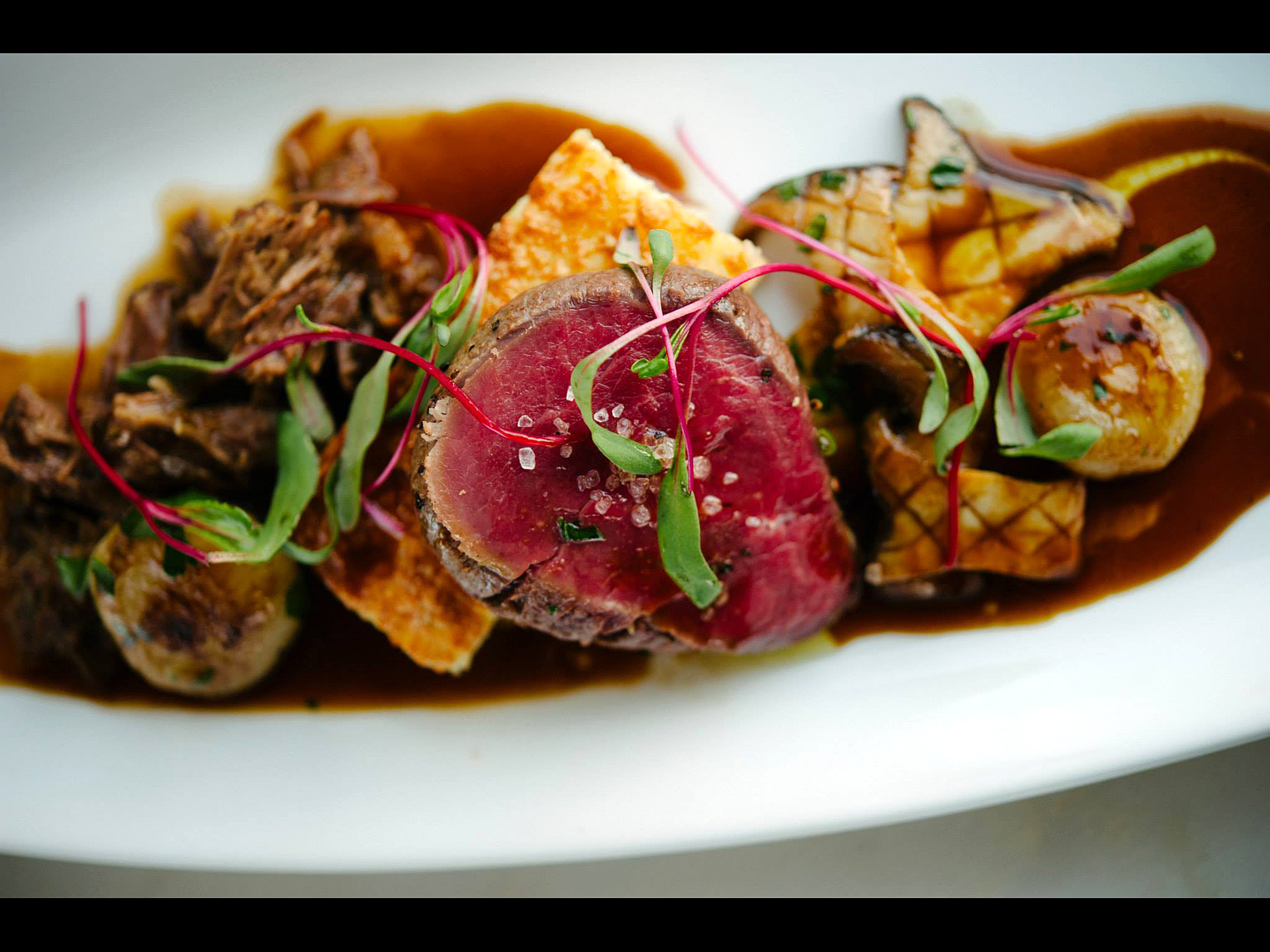
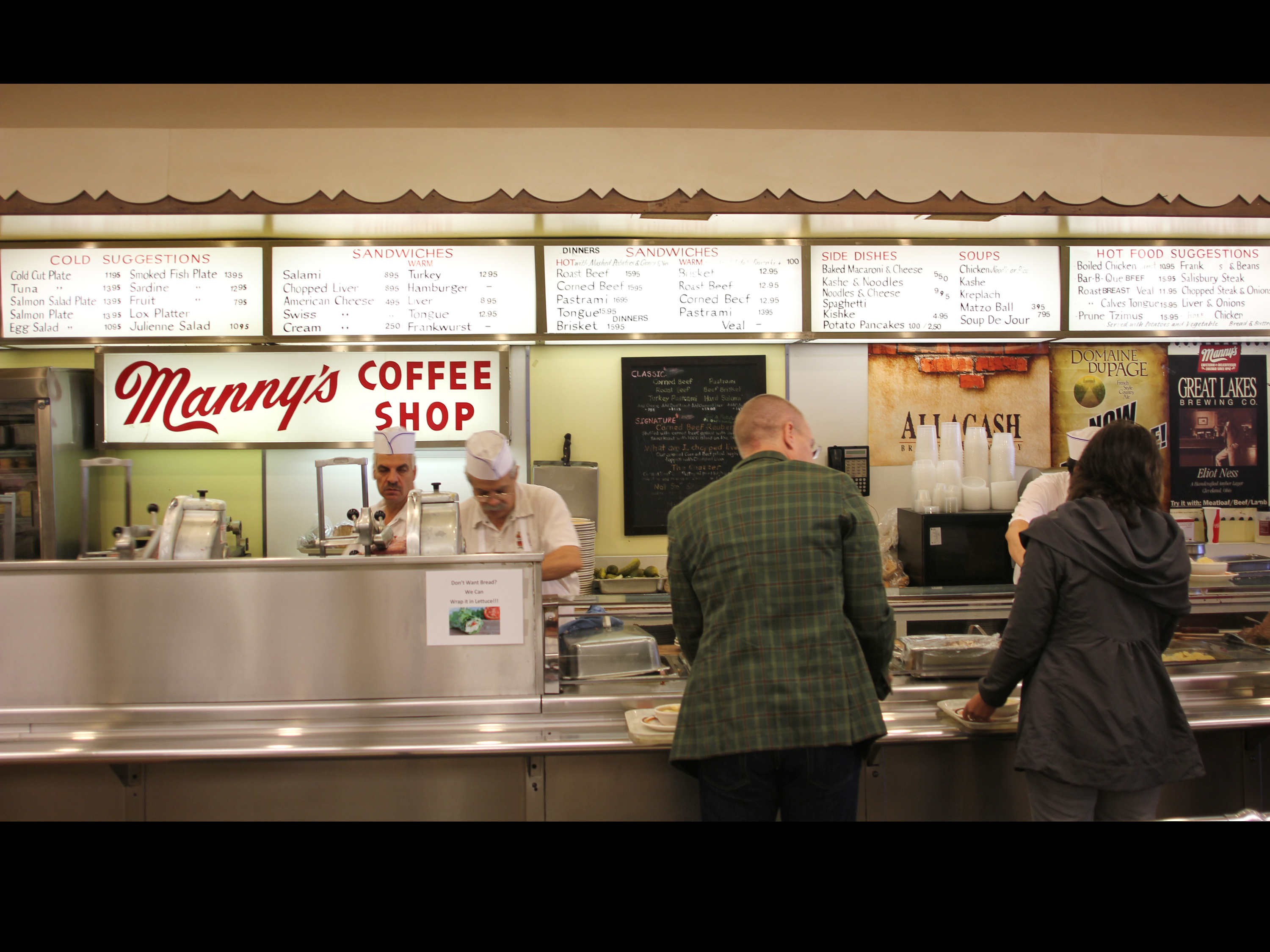
Great story been thinking about you and your family.
If you would like to help Brendan and his family, go to this go fund me page set up by friends. https://www.gofundme.com/bighelp4thebigguy
[…] Must read of a must visit sausage stand. […]
I love Big Guys and have been a loyal customer since it opened in my neighborhood. Thanks for giving us a little insight into the man who makes it a destination to which I would gladly drive miles (if I had to).